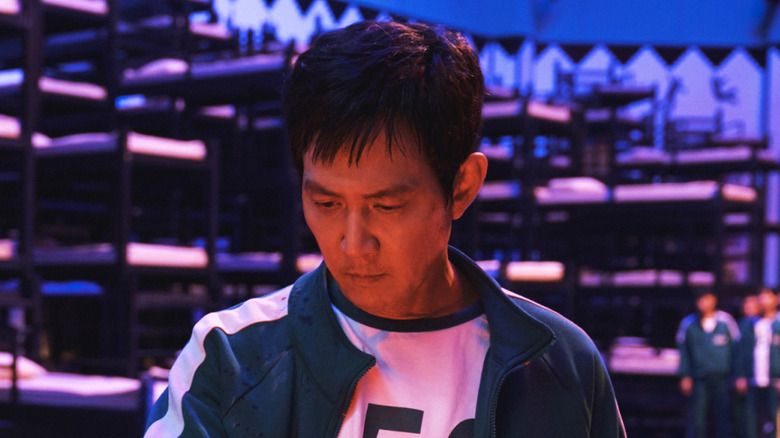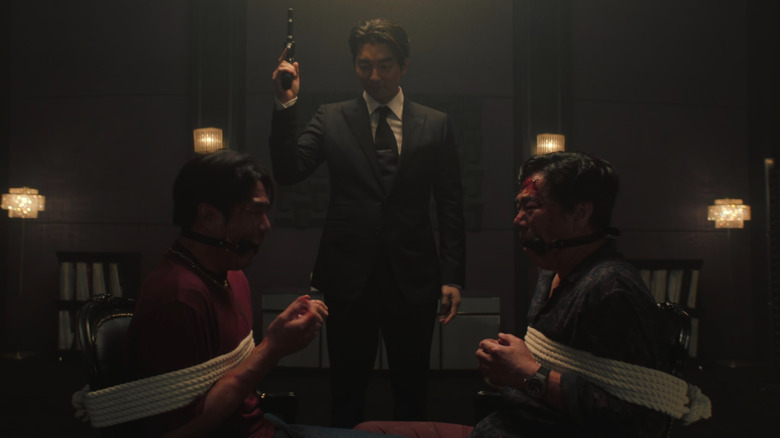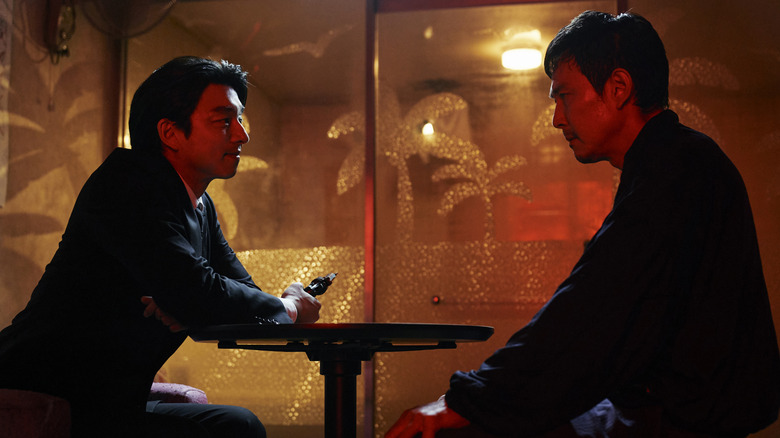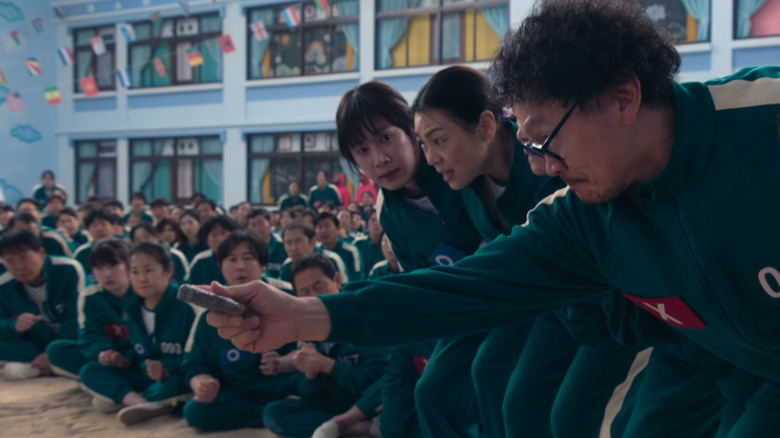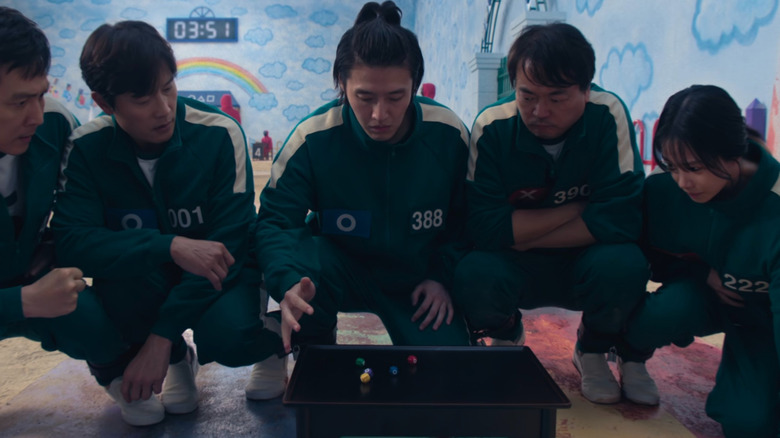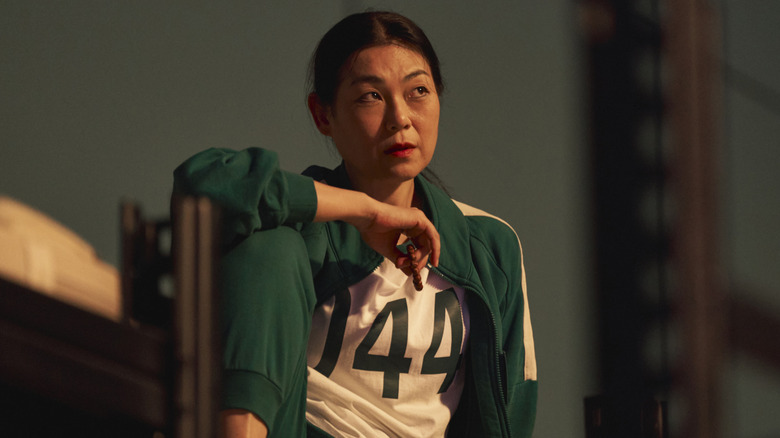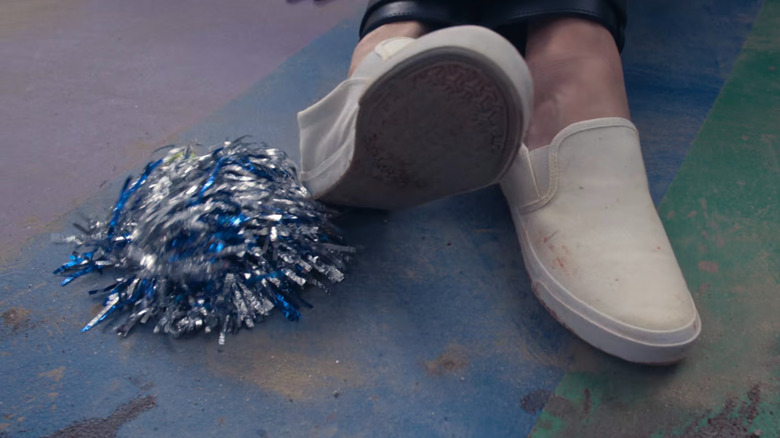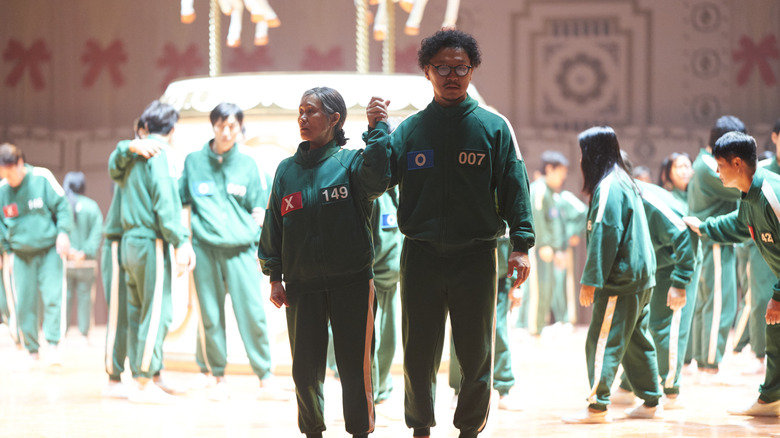Every Squid Game Season 2 Game Explained
Contains spoilers for "Squid Game" Season 2
Time to put on your green jumpsuits. "Squid Game" is back on Netflix, which means it's time to learn a whole new slate of games you'll be trying to master while trying to figure out who lives and who dies by the end of Season 2.
"Squid Game" Season 2 is a mildly entertaining but lackluster follow-up to the 2021 smash-hit South Korean thriller series that feels far less ambitious in terms of plot, character development, and scope. But creator and director Hwang Dong-hyuk has at the very least mined his memories of playground games for novel and deadly takes on classic childhood contests. From Russian roulette and a new version of Rock, Paper, Scissors to the titillating mini-games of the dramatic six-legged race, there's plenty of new playtime to unpack.
Rock, Paper, Scissors – Minus One
The first new game introduced in "Squid Game" Season 2 is a tweaked version of Rock, Paper, Scissors unique to Korea. After watching the mysterious recruiter (Gong Yoo) cruelly play mind games with several unhoused people trying to rest in the hot city sun (he makes them choose between a scratch-off lottery ticket and a roll), Seong Gi-hun's (Lee Jung-jae) hired associates get themselves captured by the sadistic salesman. They awaken in a dark room, where they are bound together, held at gunpoint, and forced to play this new game.
Called "Rock, Paper, Scissors – Minus One," this variant requires players to use both hands for each play. Instead of throwing out only one choice each round, each player throws out two — then removes (or, rather, subtracts) one from play after seeing their opponent's hands. It adds an additional layer of psychological gameplay to the original-recipe contest, which makes it even more fitting for "Squid Game." Including multiple hands also opens up the potential for this variant to be played by up to four people, similar to another Korean variant of Rock, Paper, Scissors called Muk-jji-ppa.
Russian roulette
The threat of death in "Rock, Paper, Scissors – Minus One" comes from an additional "game" being played on the sidelines by the recruiter. Russian roulette (so named for its widely presumed country of origin) involves two or more people loading a standard six-shooter revolver with only a certain number of bullets, thus leaving blank spaces in the cylinder that will not react when the gun is fired. Each player will then take turns firing the gun, gambling with their own life. Not much is known about how Russian roulette came to be, but as seen in "Squid Game," it's a very adaptable game, the dynamics of which can be altered dramatically by a number of factors.
When the recruiter first begins the game, he spins the cylinder for each round, meaning each pull of the trigger carries the same one-in-six chance of ending a life (a malicious sort of torture in and of itself). When he later plays the game with Seong Gi-hun, however, he does not move the cylinder after the initial spin, which means the likelihood of death increases each time the trigger is pulled. Their contest ultimately results in one of Season 2's biggest, most jaw-dropping deaths. The third variation, in which the cylinder is filled with five bullets, seems both less common and more despicable.
Flying Stone
If there's one game in "Squid Game" Season 2 that we feel confident we could beat, it's Flying Stone. The second game in the somewhat arduous six-legged race (the first being Ddakji, which was played in the first season), it simply consists of a player throwing a stone at another, standing stone (which eerily looks a lot like a headstone in graveyard).
If they knock the stone down, they succeed and are allowed to move forward in the race. If not, they must walk all the way up to the stone, retrieve their wayward projectile, and start again. Stone throwing as a means of recreation is obviously not specific to Korea, and has been around since at least the days of ancient Greece. That said, it is unclear if Flying Stone is a particularly popular playground game in South Korea, or if there are more specific rules unique to the country that aren't obvious in its brief appearance on "Squid Game."
Gonggi
The third game in "Squid Game" Season 2's six-legged race is Gonggi, a highly dexterous test of skill (which some characters, for whatever reason, associate with women). Played with five stones — called gonggitdol in Korean — the game tests your hand-eye coordination by having you throw one stone up in the air while trying to collect others from the ground.
You begin by throwing all five stones in front of you like dice. Then, one by one, you pick them up while throwing another in the air. In the second round, you throw one stone in the air and collect the remaining four stones in groups of two. Next, you throw one stone and collect the rest in as a group of three and a solitary stone. You then throw all five stones in the air and attempt to catch them with the back of your hand — and, finally, you launch them from the back of your hand and catch all five one last time. As involved as it sounds, "Squid Game" makes it look a lot easier than Flying Stone or the game that succeeds it.
Spinning Top
After the players breeze their way through Gonggi, the six-legged race progresses to the Spinning Top. The rules are seemingly very simple here — a player must wrap a length of cord around a top, launch it from the palm of their hand, and successfully get it to spin once it lands on the ground. Think the Japanese spinning toy Beyblades, but more difficult and potentially more deadly (depending on the TV show you're in). It also bears a similarity to the Korean game Paengi Chigi, which also involves launching spinning tops with lines of cord. In the latter game, however, the player is also required to prolong the top's spin as much as possible with a wooden stick.
Spinning Top is arguably one of the most forgettable and frustrating games of Season 2. It's really only notable for providing a moment of manufactured tension when undercover Front Man Hwang In-ho (Lee Byung-hun) fails to succeed at it in a timely manner, seemingly as part of the disappointing Season 2 twist in his storyline, which feels like deja vu in the worst way.
Jegichagi
The final contest of the six-legged race is Jegichagi, which American viewers will likely recognize for its similarities to the game Hacky Sack. Like that game, Jegichagi consists of a player hitting an object (in this case a jegi, which looks like a small, paper-wrapped disk adorned with ribbons, similar to a badminton shuttlecock) with their foot as many times as possible.
The origins of Jegichagi are not exactly known, with even its cultural genesis being up for debate (some attribute it to Korea, others to China). Today, it is largely played at festivals during Korean holidays such as Chuseok (an autumnal harvest festival) or Seollal, the Korean New year.
Mingle
Arguably the best new game of "Squid Game" Season 2, Mingle is just as diabolical as it is fun to watch. The third official game of this new slate after the six-legged race (and, sadly, the final one before the season takes a turn toward endless gunfire), it takes place in a large rotating room with a carousel at its center. As the room rotates, a song plays for a random amount of time. Once the room and the song stop at the same time, a number is called. Players must then get in groups of that number and find safety behind one of the room's locking doors.
Mingle is a popular game across the world that is often used as an ice breaker in environments like college dorms or new office buildings. Sometimes, once a group of a certain number is formed, players will be prompted to exchange facts about themselves. Similarly, in "Squid Game," Hwang In-ho uses Mingle to share the fact that he's a murderer — though, unfortunately, he seems to have confused the larger purpose of the game, breaking necks instead of ice. Hopefully when you bust out Mingle or any one of the games from "Squid Game" Season 2 at your next party, things don't get quite as intense.
